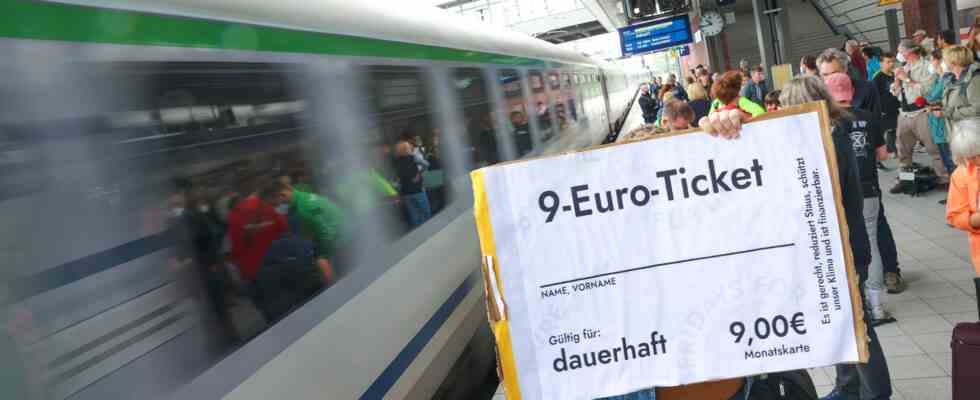Status: 09/19/2022 06:53 a.m
At a special conference of transport ministers, the federal and state governments are talking about a follow-up offer to the 9-euro ticket. A quick agreement is not to be expected – there is a dispute over money.
Chancellor Olaf Scholz praised the 9-euro ticket as the “best idea” that the traffic light had. Pay once and then take the bus, tram, S-Bahn, U-Bahn or regional train nationwide – regardless of national borders or areas of validity of tariff associations: initially viewed with skepticism, the offer became a mega success. In the three summer months of June, July and August, the inexpensive ticket was sold 52 million times.
On the one hand, the offer showed how easy it can be to use buses and trains, and on the other hand it also revealed where the weak points in the regional networks lie. Federal Transport Minister Volker Wissing, who had the idea for the ticket, even called it a “sensation” that the federal and state governments managed something like this together. The Greens were happy that public transport was suddenly on everyone’s lips.
The federal government wants to push ahead with the traffic turnaround
As soon as the success of the 9-euro ticket became apparent, there was a call for a follow-up offer. Wissing sees an opportunity for local public transport, as there are many people switching to public transport. He is concerned with making the use of buses and trains throughout Germany “low-threshold”, whether spontaneous, occasional or just in stages.
The Federal Government is convinced that the citizens want an attractive, Germany-wide range of tickets. At the beginning of September, the traffic light therefore presented: The federal government will make 1.5 billion euros available for such a project if the federal states make a corresponding financial contribution.
Fair plan or poisoned offer?
The federal states are divided on whether the federal proposal is fair and, above all, feasible. Im spoke of a “poisoned invitation”. ARD morning magazine North Rhine-Westphalia Prime Minister Hendrik Wüst. The CDU politician pointed out that local public transport has been underfunded for years. Care must be taken to ensure that public transport does not have to reduce its services.
Saxony-Anhalt’s Prime Minister Reiner Haseloff also expressed general concerns. 80 percent of the population of his federal state live in rural areas, for which a successor to the 9-euro ticket would bring nothing.
And from Bavaria and other federal states it was said that something like that could not be afforded financially. On the other hand, Lower Saxony, Mecklenburg-Western Pomerania and Rhineland-Palatinate, for example, were open to a follow-up solution.
And the red-red-green governed Berlin has already decided on its own successor ticket. It is valid for a limited time and only in the capital area and will cost 29 euros. For a nationwide successor, prices between 49 and 69 euros are under discussion. At 828 euros per year, the upper price range would be more expensive than many regional subscriptions currently available and is unlikely to become a successful model.
Countries want money for expansion
As different as the positions of the countries are, they all have in common the demand for more money for the expansion of public transport. Whether in rural areas or in urban areas.
The Bremen environment senator and chairwoman of the transport ministers’ conference, Maike Schaefer, said that the states agreed that the federal government had to make more money available. A requirement of 1.5 billion per year has already been calculated. Investments must be made in expanding routes, in more frequent timetables, in new vehicles and in accessibility. “Of course, that costs billions and that’s where the federal government comes into play,” says Schaefer. In view of high energy costs and inflation, the need for additional financial support has already been identified.
Environmental organizations put pressure on
Environmental groups fear that the idea of a 9-euro successor could fail because of money. Before the special conference of transport ministers, they renewed their call for the abolition of the tax privilege for company cars, which companies can use to deduct the costs of company cars from their taxes. The Greens had proposed this to finance a follow-up regulation to the 9-euro ticket.
According to Greenpeace, subsidizing a Porsche 911 as a company car costs the state as much money as the subsidy for 50 climate tickets with an annual price of a maximum of 365 euros. The German Environmental Aid also called for a reform of the “subsidies for climate killer company cars” and demanded that the federal government bear the entire cost of a nationwide valid 365-euro climate ticket.
No quick agreement in sight
Schaefer dampened expectations of a quick agreement: “I don’t know whether we’ll come out with a concrete result on Monday.” That depends on many factors. However, the Green politician is expecting a process of how things could continue. The aim is that a follow-up ticket can be launched on January 1, 2023.
Successor to the 9-euro ticket – special conference of transport ministers
Dietrich Karl Mäurer, ARD Berlin, September 19, 2022 6:26 a.m

